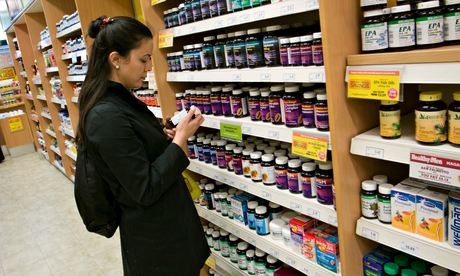
Doctors say we need them. Advertising encourages us to take them. And – with industry estimates of more than £36bn being spent on them worldwide – we are clearly buying them. Yes, we're talking about supplements – things that most people will agree are good for us. But what if we don't really need them? This is the question I try to answer every day at Examine.com. Our agenda is simple: to tune out the hype and see what science has to say. A recent survey has shown that multivitamins, protein powders, fish oil, vitamin D and glucosamine are among the most popular supplements. But are they doing us any good?
Multivitamins
The hype: For years, "one a day" has been the cornerstone of many health regimens, but recent research has poked holes their popularity. Before you take any type of vitamin or mineral, ask yourself: why am I using this? Several scientific reviews have shown daily multivitamins have a lacklustre effect when it comes to preventing heart attacks and improving cognition. This, in turn, has resulted in an overreaction and now everyone is saying that multivitamins are a waste of time.
Do you need them? Instead of taking one pill that can't possibly fit every person's daily requirements, we recommend supplementing specific deficiencies or needs. If you're worried about a particular health problem, search for the common vitamin weakness, and look at your diet. Common deficiencies include vitamins D, K, and minerals such as magnesium. For instance, if you don't eat many vegetables, there's a high likelihood you could use some more vitamin K. There are two situations when a multivitamin is a good option: if you pay no attention to your diet or are always dieting. Multivitamins still have flaws, but getting some of those nutrients is better than none.
Fish oil
The hype: Good heart health has become closely linked to the use of healthy fats, particularly fish oil. Now they are one of the biggest products on the market. It was originally thought that fish oil could keep our hearts healthy with its anti-inflammatory and triglyceride-lowering properties. However, a few recent studies suggest it has no benefit. The catch? Those studies used populations of "high-risk" individuals, meaning the research was hiding the real story and benefits.
Do you need it? In newer studies focusing on blood work, those with the lowest levels of fish oil (specifically EPA and DHA) have the highest risk of heart disease. Similarly, those with the highest levels of EPA and DHA in their blood have the lowest risk. While more experiments are needed, there are plenty of reasons to take fish oil. Research suggests that it helps with brain development and also mental illnesses. Given its safety, price, and potential benefits, the odds are that this is a product worth taking. Algae oil is a good vegetarian alternative.
Vitamin D
The hype: Vitamin D was first recognised as essential in bone and mineral metabolism – without it, in childhood people can develop a bone-deforming disease called rickets. Recently, though, it was found that vitamin D could have an effect on many other systems, including the cardiovascular, muscular, endocrine and nervous. Because of this, it was touted as a super-supplement that could cure all ills.
Do you need it? For those with genuine deficiency, vitamin D supplementation has truly beneficial effects. If your vitamin D levels are in check, you won't notice much difference. A blood test will show your vitamin D levels, and from there you can make an informed decision. If you are not due for a checkup any time soon, take 2,000 IU per day. This has been shown to be both a safe and effective dose.
Glucosamine
The hype: One of the most common things I see in my own clinic is joint pain and osteoarthritis. Unlike many deficiencies, pain and discomfort is something you can feel, meaning you are much more likely to take action. Glucosamine is one of the most common go-to supplements, and luckily it appears to offer benefits for both pain relief and slowing down arthritis … but there's a catch, or two.
Do you need it? Check the label. You will need glucosamine sulphate, as glucosamine hydrochloride has been shown to be less effective. Also, make sure your dosage is enough. For any benefit, you must take at least 1,500mg daily. It may not be a miracle supplement, but it could be worth using instead of non-steroidal anti-inflammatory drugs (NSAIDs) or paracetamol.
Protein powder
The hype: Slowly but surely, protein powders have become a common part of a regular diet. Once reserved for people who are trying to bulk up or those on a rapid weight-loss plan, protein powder is now used for everything from snacks to post-workout refreshment. As its popularity has grown, so has the variety of options.
Do you need it? Powders are simply the most easily ingested and convenient form of protein. Whey protein has been shown to help ageing men increase or preserve muscle mass, which is very important for mobility and overall health. This is likely due to its highly concentrated levels of branched chain amino acids, often an area of deficiency for those who don't eat enough protein. To find out if you should use it, work out whether or not you are not eating enough regular protein. As a general rule of thumb, we recommend 1.5-2.2g per kg of bodyweight per day, especially if you are active.
• This footnote was amended on 8 April 2014 to add information about Dr Spencer Nadolsky's former links to Leaner Living. Examine.com is an independent encyclopedia on supplementation and nutrition. It does not accept advertising. Dr Nadolsky was a co-founder and owner of Leaner Living, a website which sells supplements. He no longer has any connection with Leaner Living, which is now run by his brother. The content written by Dr Nadolsky was verified by all five researchers at Examine.com.

